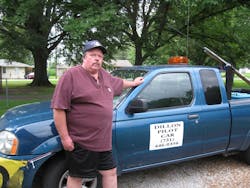Johnny Dillon says he “just kind of fell into” the pilot car business. He’d retired from working in a local meat plant and was looking for something to do when a friend asked if he would drive a second pilot car for an over-dimensional load. After a couple of trips, the dispatcher who handled wide loads for the trucking company suggested he start his own pilot car business—and “the rest is history.” Dillon took his first wide load assignments in August 2014. He pilots within Tennessee, Mississippi, Arkansas, Louisiana, Missouri, Kentucky, and Illinois. His vehicles are a 2005 Nissan XE pickup truck and a 2010 Ford Escape.
Q: How do you locate loads for which you run a pilot car?
A: Originally it was the trucking company dispatcher who suggested I go into business who’d call me when they needed a pilot car. Now I have a number of truck drivers who call me to pilot their loads.
Q: How is vehicle maintenance handled? Do you have your own shop, or is the work jobbed out? What about major repairs?
A: I use Alford Tire in Dyer, TN, for all my preventive maintenance. So far (knock on wood), I haven’t had any major repairs. Most likely I would, if needed, use a local independent repair shop if it’s ever required. One thing about pilot vehicles is that you don’t want new; you want something used that’s dependable and easy to repair.
Q: How do you minimize downtime?
A: I have the oil changed and the vehicles greased every 4,500 mi., and other maintenance items are done within the manufacturer’s guidelines. It’s very important that I have zero repair or maintenance downtime on the road because of the limited daylight driving window over-dimensional loads have.
Q: What are your specifications for your vehicles?
A: Compact or small pickups make the best pilot vehicles—used, not new, but not too old, either. The vehicle needs to get between 25 to 30 mpg, preferably 30 mpg. A long bed is preferred because of the mobile home tires and wheels we have to haul from time to time. It’s not uncommon to have multiple flat tires on a mobile home during transit, so it’s best to be prepared.
Q: Which government regulations create the biggest challenge to your business and profitability?
A: There really aren’t any I can think of, maybe the commercial auto liability insurance. It costs about $100 per month for $500,000 in liability insurance. I’m fortunate to run within the states I do, as I understand many of the other states require $1 million in coverage.
Q: What does your company do best?
A: I would say customer service—having the tools and equipment to keep the over-dimensional driver rolling. And I would also say being dependable—being ready to roll at a moment’s notice and being on time when meeting the trucker.
We want to hear from you. Know of a trucking business we should feature? Send their contact information to [email protected].
